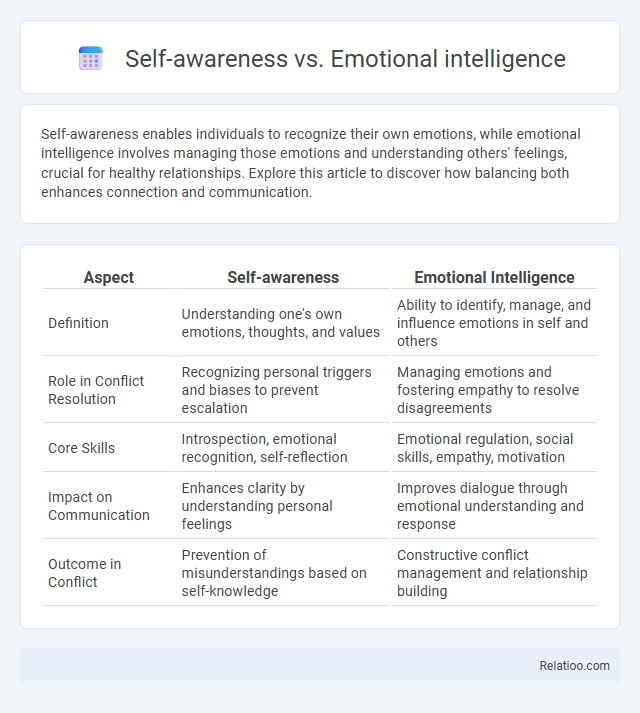Self-awareness enables individuals to recognize their own emotions, while emotional intelligence involves managing those emotions and understanding others' feelings, crucial for healthy relationships. Explore this article to discover how balancing both enhances connection and communication.
Table of Comparison
| Aspect | Self-awareness | Emotional Intelligence |
|---|---|---|
| Definition | Understanding one's own emotions, thoughts, and values | Ability to identify, manage, and influence emotions in self and others |
| Role in Conflict Resolution | Recognizing personal triggers and biases to prevent escalation | Managing emotions and fostering empathy to resolve disagreements |
| Core Skills | Introspection, emotional recognition, self-reflection | Emotional regulation, social skills, empathy, motivation |
| Impact on Communication | Enhances clarity by understanding personal feelings | Improves dialogue through emotional understanding and response |
| Outcome in Conflict | Prevention of misunderstandings based on self-knowledge | Constructive conflict management and relationship building |
Introduction to Self-Awareness and Emotional Intelligence
Self-awareness involves recognizing and understanding your own emotions, thoughts, and behaviors, which forms the foundation for personal growth. Emotional intelligence expands on self-awareness by incorporating the ability to manage your emotions and empathize with others, enhancing social interactions and decision-making. Developing both skills empowers you to navigate complex emotional landscapes effectively and improve relationships.
Defining Self-Awareness: The Foundation of Personal Insight
Self-awareness is the ability to recognize and understand one's own emotions, thoughts, and behaviors, forming the foundation of personal insight. Emotional intelligence builds on self-awareness by incorporating the capacity to manage emotions effectively and navigate social complexities. Developing self-awareness enhances emotional intelligence, leading to improved decision-making and interpersonal relationships.
What is Emotional Intelligence? Key Components Explained
Emotional intelligence refers to the ability to recognize, understand, and manage one's own emotions while also perceiving and influencing the emotions of others. Key components include self-awareness, which involves accurately assessing one's emotions; self-regulation, the capacity to control impulsive feelings and behaviors; social skills, essential for effective communication and relationship-building; empathy, the aptitude for understanding others' emotional perspectives; and motivation, driving oneself toward goals with persistence. Mastery of these elements leads to improved interpersonal interactions, decision-making, and emotional well-being.
Differences Between Self-Awareness and Emotional Intelligence
Self-awareness involves recognizing and understanding one's own emotions, thoughts, and behaviors, while emotional intelligence encompasses the ability to manage and respond to both personal emotions and those of others effectively. Emotional intelligence includes self-awareness as a foundational component but extends to skills like empathy, social skills, and emotional regulation. The key difference lies in self-awareness being an internal insight, whereas emotional intelligence applies that insight toward interpersonal communication and emotional management.
The Interconnection: How Self-Awareness Influences Emotional Intelligence
Self-awareness serves as the cornerstone of emotional intelligence by enabling individuals to recognize and understand their own emotions, which enhances their ability to manage those emotions effectively. This foundational skill allows for greater empathy and social awareness, improving interpersonal relationships and emotional regulation. Research from Daniel Goleman highlights that heightened self-awareness directly correlates with strengthened competencies in emotional intelligence domains such as self-regulation and social skills.
Benefits of Developing Self-Awareness
Developing self-awareness enhances your ability to recognize personal emotions and thought patterns, leading to improved decision-making and stress management. Unlike emotional intelligence, which involves understanding others' emotions, self-awareness focuses on internal reflection, fostering greater authenticity and personal growth. Benefits include increased resilience, better communication skills, and enhanced leadership capabilities that empower you to navigate complex social and professional environments effectively.
Advantages of High Emotional Intelligence in Daily Life
High emotional intelligence enhances your ability to manage stress, communicate effectively, and resolve conflicts, leading to stronger personal and professional relationships. It supports better decision-making by helping you recognize and understand your emotions and those of others. Cultivating emotional intelligence improves empathy, adaptability, and social skills, which are essential for daily interactions and overall well-being.
Practical Strategies to Improve Self-Awareness
Practical strategies to improve self-awareness include regular mindfulness meditation, journaling to track emotions and reactions, and seeking honest feedback from trusted colleagues or mentors. Developing emotional intelligence involves recognizing and managing your own emotions, as well as understanding and influencing the emotions of others, which can be enhanced through empathy training and active listening exercises. Building self-awareness creates a foundation for emotional intelligence by fostering a clearer understanding of personal triggers, strengths, and weaknesses, enabling more effective interpersonal interactions and decision-making.
Techniques to Enhance Emotional Intelligence
Techniques to enhance emotional intelligence include practicing mindfulness, which improves self-awareness by helping individuals recognize and understand their emotions in real time. Developing empathy through active listening and perspective-taking fosters better social interactions and emotional regulation. Implementing reflective journaling enhances self-awareness, allowing deeper insight into emotional patterns and promoting emotional intelligence growth.
Conclusion: Integrating Self-Awareness and Emotional Intelligence for Personal Growth
Integrating self-awareness and emotional intelligence empowers your personal growth by enhancing your ability to recognize and manage both your internal states and interpersonal dynamics. Self-awareness provides insight into your emotions and behaviors, while emotional intelligence equips you to respond empathetically and adaptively to others. Together, these skills create a foundation for improved decision-making, relationship-building, and emotional resilience.

Infographic: Self-awareness vs Emotional intelligence
 relatioo.com
relatioo.com